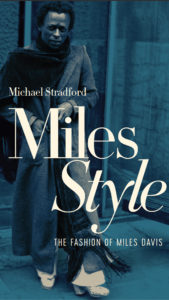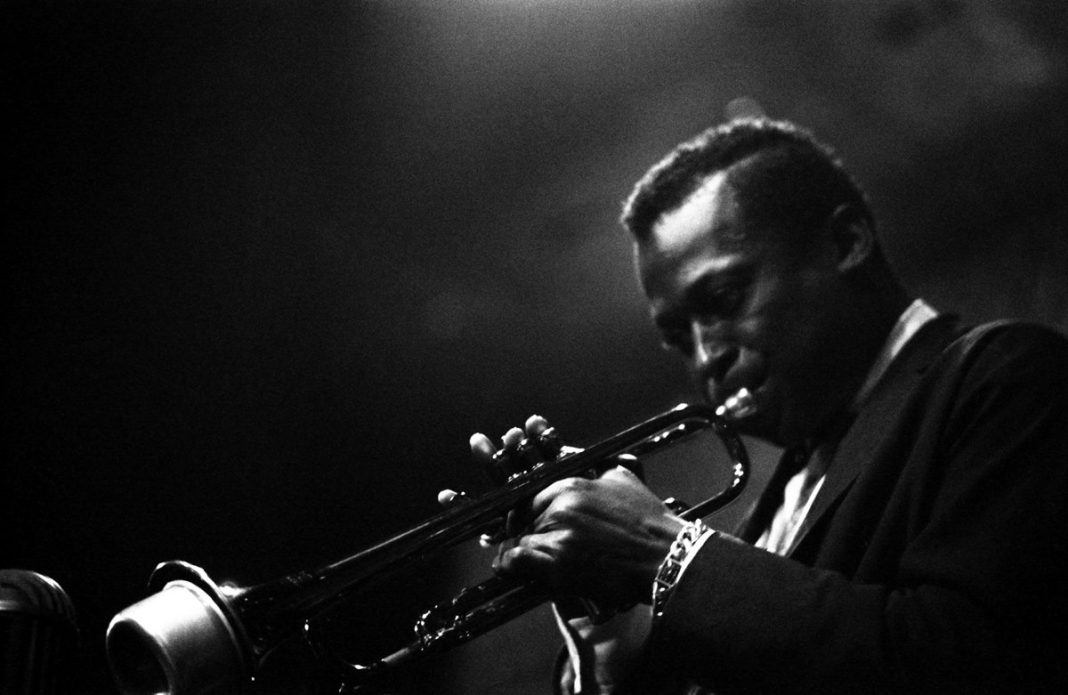There are literally dozens of books about jazz musician Miles Davis. Everything from individual albums to biographies to his art have been dissected in these books. One aspect of his life that hasn’t previously been analyzed is his style – specifically his look and clothing. Until now. Michael Stradford is the author of a new book called MilesStyle: The Fashion of Miles Davis that does just that.
As Stradford says in the introduction to his book, Davis was named to Esquire Magazine‘s 75 best-dressed men of all time. GQ called him the best-dressed musician ever.

Stradford combines his own presentation of key biographical elements with interviews with those who knew Davis: from ex-wives to musicians to stylists. Amongst those offering their perspectives on him in MilesStyle are Quincy Jones, Bryan Ferry, the late trumpeter Clark Terry, filmmaker Reggie Hudlin, his late ex-wife Frances Davis, bassist Ron Carter, Lenny Kravitz and more.
I recently spoke by phone with Stradford about his book, the conversations he had about Davis and I ask him the one question he asks every person in MilesStyle. What follows are excerpts from our conversation that have been edited for length and clarity.
Miles Davis said, “For me, music and life are all about style.” With so many other books on Davis, why do you think no one had examined his style before?
I think the strength and weight of his music was so prominent and there was so much to digest there. This was a guy who changed music several times. It’s only been in the last 10-15 years that men’s fashion has really gotten a serious look from the culture. When Miles was stylin’, people would always acknowledge it because it was unique and he was so consistent.
Style expert Lloyd Boston told you he compared Davis to Cab Calloway, Grace Jones and Lady Gaga as a fellow “rainmaker.” Do you see the same through line he does with Davis?
I can see it in that everyone was a trailblazer and marched to their own beat. Cab stayed the same musically, but the others you mentioned, Gaga, Grace Jones, you could put David Bowie in there, they were all chameleons, but they all had a distinct and unique presence. I think Miles easily falls within that lineage.

Something else Boston said intrigued me, “Knowing when to stop makes it elegant and understated.” That seems, at least up to Bitches Brew, to describe his music. How much do you think his music influenced his style and vice-versa?
I think Miles saw everything creatively. So I think his music influenced his style. His cooking influenced his style. The cars he drove – the Maserati, the Jag, the Ferrari – influenced his style. The last 8-9 years of his life he went into this avant-garde look that was contrary to what he’d done before. I never got a handle on what it was about the avant-garde Japanese designers and the big floral Versace clothes that got into his design.
For someone for whom music was everything, why did he put so much emphasis on how he appeared?
I think part of it had to do with respect. He wanted to be taken seriously and I think he thought you can’t be taken seriously if you aren’t taken seriously for what you wear. Dexter Gordon sent him to a tailor and that was the first time he had clothes made and he understood the impact of how he presented himself.
Did Miles Davis in any way influence your own perspective on clothes and how to present yourself?
He made me think about it seriously because he always looked impeccable. I appreciated that. I thought it was too much work for me personally, but I liked the idea that visually when I went out I looked presentable – whether a casual gathering or an after-five outing.
I always enjoyed his mid-50s to mid-60s look when he was wearing Italian-cut suits. I think that’s his most timeless look. He was particular about the quality of the fabric, how it was cut, how it lined up against another fabric. Some of it works on me and some of it doesn’t. I found that educational and have tried to apply that over time.
I’m intrigued by Quincy Jones and his concern about today’s musicians not knowing music history. Why should younger generations care about Miles Davis, both as a musician and a fashion icon?
For an artist trying to build a career, Miles’ path can be an inspiring one because of the way he started and the hurdles he faced – including his own demons. His fearlessness in changing bands and direction when nobody supported it. Miles Davis plays out a life and career path that is worth investigating. All roads are bumpy, it’s how you navigate them that counts.
As far as clothes, it speaks to a uniqueness of him as a person and his personal vision. If someone has the music and they watch the look to match, it’s trial and error and you find the right thing that works for you. Miles is a great example of that.
If you could go back in time and spend a year with Miles Davis, what period would you want that to be and why?
It would probably be the mid-to-late 50s because that was his real coming out. That was when he conquered his heroin addiction and came back to New York renewed with a sense of clarity of the kind of artist he wanted to be. That leads to Kind of Blue which is the best-selling jazz album of all time. It would be interesting to be with him to watch that progress and see what influences him and what he’s responding to and what he’s not.
Throughout the book you ask everyone you interviewed to describe Miles Davis in one word. How would you answer that question?
Ha ha! That’s a good one. To me it all comes back to cool. To me he is the epitome of cool or at least he project the idea of cool. I like the idea of grace under pressure which I think cool is and he exhibited that often. Just an ability to be comfortable in his own skin to the extent he didn’t care what anyone else thought. That to me is cool. That would be my word.
Michael Stradford’s MilesStyle is available now.
On Monday, August 31st, Stradford will be hosting a conversation about The Enduring Cultural Legacy of Miles Davis on MOBE Symposium at 7:00 PM EDT/4:00 PM PDT. Joining him for that conversation will be Vince Wilburn, Jr and Erin Davis from Miles Davis Properties, LLC; Nicole London and Stanley Nelson, the producer and director of Miles Davis: Birth of the Cool; John Jackson from Legacy Recordings and musician/composer Marcus Miller. The event is free, but you do need to register to join.
Photo of Miles Davis courtesy of MilesDavis.com
Photo of MilesStyle and Michael Stradford courtesy of the author










